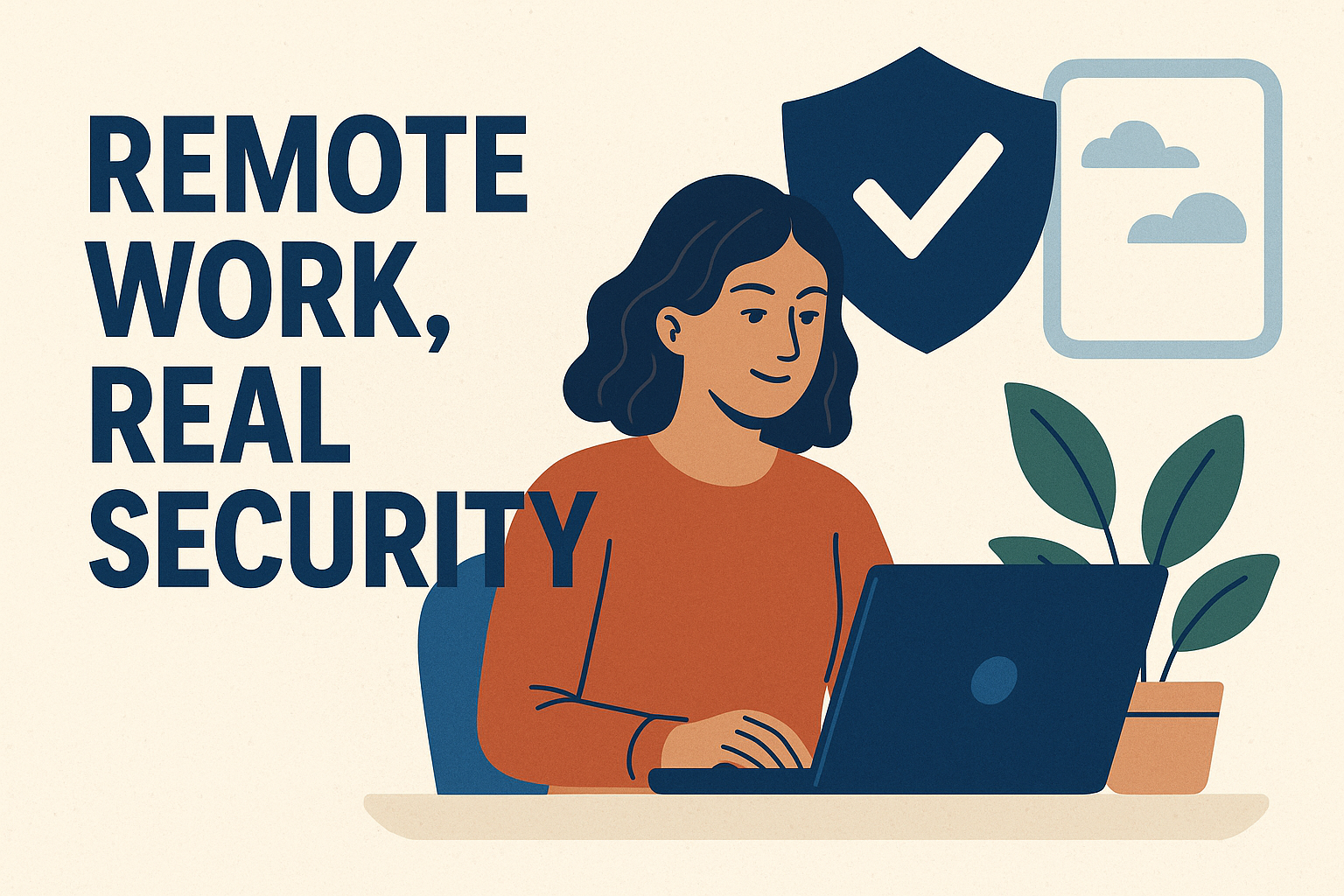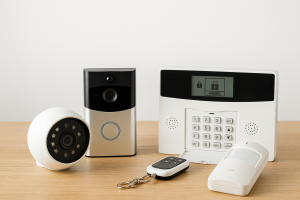Are you curious if you can build a successful career in cyber security without leaving your home? Imagine protecting important data, stopping hackers, and earning a great income—all from your own space.
Working in cyber security from home is not just possible; it’s becoming a smart choice for many professionals like you. You’ll discover exactly how to make it happen, what skills you need, and how to stay ahead in this fast-growing field.
Ready to unlock your potential and take control of your career? Keep reading to find out how.

Credit: keyinsiteconsultancy.co.uk
Setting Up A Secure Home Workspace
Creating a secure home workspace is vital for cyber security professionals working remotely. The right setup protects sensitive data and boosts productivity. It also supports physical well-being and reduces distractions. Focus on three main areas: location, comfort, and physical security. Each part helps maintain a safe and efficient work environment.
Choosing The Right Location
Select a quiet spot with limited foot traffic. Avoid places near windows or doors that can cause distractions. A dedicated room or corner helps keep work separate from daily life. Ensure good lighting to reduce eye strain. The area should have reliable internet and power outlets. This setup minimizes risks and improves focus.
Ensuring Ergonomic Comfort
Use a comfortable chair with proper back support. Position your monitor at eye level to avoid neck strain. Keep your keyboard and mouse within easy reach. Maintain a good posture to prevent fatigue. Take regular breaks to stretch and relax muscles. Ergonomic comfort enhances long-term health and work quality.
Maintaining Physical Security
Lock your workspace when not in use. Store devices and sensitive documents in secure places. Use privacy screens on monitors to block side views. Avoid leaving passwords or notes visible. Keep backup drives and hardware in locked drawers. Physical security reduces the chance of data theft or damage.

Credit: www.facebook.com
Essential Tools For Remote Cybersecurity Work
Working from home in cybersecurity demands the right tools. These tools ensure data security and efficient workflow. Let’s explore essential tools for remote cybersecurity work.
Reliable Hardware And Software
Start with a reliable computer system. A fast processor and adequate RAM are crucial. Ensure your system runs updated operating systems. This reduces vulnerability to cyber threats. Use reputable antivirus software. It protects your system from malware attacks. Regularly update all software to close security gaps.
Using Vpns And Secure Connections
Always use a Virtual Private Network (VPN). It encrypts your internet connection. This keeps your data private from hackers. Choose a VPN service with a strong reputation. Secure connections are vital for remote work. Use encrypted email services for safe communication.
Implementing Multi-factor Authentication
Multi-Factor Authentication (MFA) adds an extra security layer. It requires more than just a password. Users need a second form of identification. This could be a text code or authentication app. MFA makes unauthorized access much harder. Implement MFA on all critical accounts.
Best Practices For Data Protection
Protecting your data while working from home in cybersecurity is not just important—it’s essential. The digital threats you face daily require a solid approach to keep your information safe and maintain your clients’ trust. Let’s look at some practical ways you can guard your data effectively.
Regularly Updating Software
Outdated software creates easy targets for hackers. You should set your devices to update automatically or check for updates at least once a week.
Think about the last time your computer warned you about an update. Ignoring it might have seemed harmless then, but those updates often patch security holes hackers want to exploit.
Keeping all software current—from your operating system to the apps you use—reduces your risk of cyberattacks and keeps your defenses strong.
Safe Password Management
Passwords are your first line of defense. Using simple or repeated passwords makes it easier for attackers to get into your accounts.
Try using a password manager to create and store complex passwords. This way, you only need to remember one master password, and your other credentials stay secure.
Also, enable two-factor authentication (2FA) whenever possible. This adds an extra step that can stop hackers even if they get your password.
Backing Up Critical Data
Imagine losing important files because of a ransomware attack or hardware failure. Backups are your safety net in such scenarios.
Regularly save copies of your crucial data to an external drive or a trusted cloud service. Make sure these backups are separate from your main system to avoid simultaneous loss.
Test your backups occasionally to ensure you can restore data quickly when needed. Having a backup plan means less stress and less downtime if something goes wrong.
Managing Work-life Balance
Managing work-life balance while doing cyber security work from home can be challenging. The lines between professional duties and personal time often blur, making it easy to overwork or feel distracted. Finding a clear rhythm that respects both your job and your life is essential for long-term success and well-being.
Setting Clear Boundaries
Define specific start and end times for your workday to protect your personal time. Communicate these hours to your family and colleagues so everyone respects your schedule. Creating a dedicated workspace helps signal to your brain when it’s time to focus and when it’s time to relax.
Think about how often you check emails or respond to messages outside work hours. Could setting rules for this improve your focus and reduce stress? Your ability to disconnect is just as important as staying connected during work hours.
Scheduling Breaks Effectively
Taking short, regular breaks boosts your concentration and prevents burnout. Use techniques like the Pomodoro method—working for 25 minutes, then taking a 5-minute break—to maintain energy throughout the day. Stand up, stretch, or step outside to refresh your mind during these pauses.
Have you noticed how a quick break can shift your perspective on a tough problem? These pauses don’t waste time; they help you work smarter. Plan your breaks around natural lulls in your tasks or meetings for maximum benefit.
Staying Connected With Teams
Maintaining strong communication with your team reduces feelings of isolation and keeps projects on track. Use video calls, instant messaging, and collaborative tools to stay in touch and share updates frequently. Regular check-ins build trust and ensure everyone is aligned on goals.
How often do you reach out proactively versus waiting for others to contact you? Taking the initiative can improve teamwork and create a sense of community even when working remotely. Remember, cyber security often requires quick responses—being connected helps you react faster.
Staying Updated And Skilled
Staying updated and skilled is vital for cybersecurity professionals working from home. The digital world changes fast. New threats and tools appear daily. Keeping knowledge fresh helps protect systems better and build a strong career. Continuous learning improves problem-solving and response to cyber risks. It also boosts confidence in handling security tasks remotely.
Following Industry News
Reading cybersecurity news daily helps spot new risks and trends. Trusted websites and blogs share updates on attacks and defenses. Newsletters deliver important headlines straight to your inbox. Staying informed means quicker reactions to emerging threats. It helps adapt security measures to the latest challenges.
Participating In Online Training
Online courses offer flexible learning from home. They cover topics like ethical hacking, network security, and compliance. Many platforms provide certificates after completion. Hands-on labs improve practical skills. Regular training keeps knowledge sharp and relevant. It also prepares for certifications that advance your career.
Joining Cybersecurity Communities
Communities connect you with other professionals worldwide. Forums and social groups allow sharing tips and solutions. Discussions help solve problems faster. Networking opens doors to new job opportunities. Learning from peers keeps skills current and relevant. Being active in communities builds a strong support system.
Handling Common Remote Work Challenges
Handling common remote work challenges is crucial for anyone in cyber security working from home. The shift to remote setups brings unique obstacles that can impact your productivity and focus. Recognizing these challenges early helps you stay effective and secure in your role.
Dealing With Distractions
Distractions at home can break your concentration quickly. It might be household chores, family members, or even the temptation of social media. Try setting clear boundaries by creating a dedicated workspace and using noise-canceling headphones.
Have you ever noticed how a simple distraction can lead to hours lost? Using time-blocking techniques can help you stay on track. Set specific periods for deep work and short breaks to reset your focus.
Ensuring Reliable Internet Access
Your internet connection is the backbone of remote cyber security work. Unstable or slow internet can delay critical updates or communications. Investing in a high-speed plan and a quality router can save you from unexpected downtime.
Consider having a backup plan like a mobile hotspot or secondary provider. This way, you won’t be caught off guard during urgent tasks. Checking your connection speed regularly ensures you meet your job’s demands.
Overcoming Communication Barriers
Remote work limits face-to-face interaction, which can cause misunderstandings. Clear and frequent communication is essential. Use video calls to build rapport and tools like chat apps to stay connected throughout the day.
Have you ever misread an email or missed tone in a message? Adding video or voice messages can clarify your intent. Regular check-ins with your team reduce confusion and keep everyone aligned on security protocols.

Credit: www.facebook.com
Frequently Asked Questions
Can Cybersecurity Jobs Be Done From Home Effectively?
Yes, many cybersecurity roles can be done from home. Remote work is common due to digital tools and secure connections. Employers often provide VPNs and secure software to maintain data safety while working remotely.
What Skills Are Needed For Remote Cybersecurity Work?
Remote cybersecurity jobs require strong technical skills like network security and threat analysis. Communication and self-discipline are crucial for managing tasks independently. Familiarity with remote tools and protocols is also important.
Is Working From Home In Cybersecurity Secure?
Yes, if proper security measures are in place. Using VPNs, encrypted connections, and strong passwords protects sensitive data. Regular software updates and multi-factor authentication enhance remote work security.
What Cybersecurity Roles Are Suitable For Remote Work?
Roles like security analyst, penetration tester, and incident responder fit remote work. Many tasks involve monitoring, analysis, and reporting, which can be done online. Collaboration tools support team communication effectively.
Conclusion
Cyber security jobs can be done effectively from home. Many companies trust remote workers to protect their data. Working from home offers flexibility and comfort. It requires good internet and a quiet workspace. Staying updated on security threats is important.
Remote work also needs strong communication with the team. With focus and discipline, success is possible. Cyber security professionals can find good opportunities online. The demand for remote cyber security roles continues to grow. This makes work from home a practical option.







